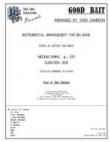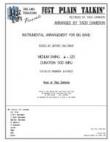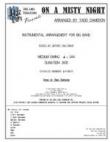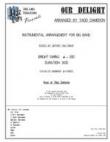Dameron, Tadd
Tadd Dameron was born Tadley Ewing Peake, the son of Isaiah and Ruth Peake. When his mother later married Adolphus Dameron, Tadd and his brother, Caesar, legally changed their names to Dameron. Caesar was a jazz pianist, bandleader, arranger, and composer who worked in Chicago and New York City. Inspired to follow a career as a jazz musician by his brother Caesar, a saxophone player. Caesar was brought his younger brother along with him to a Cleveland night club and asked if Tadd could sit in. Although they band members had known he had been studying piano, he played things many of the older professionals were not used to hearing. When he was 21, Tadd tried arranging for a big band, one formed in Cleveland by James Jeter and Hayes Pillars. He said it was 'I Let a Song Go Out of My Heart' and everything was wrong with it. He went on to play with Freddie Webster, Zack Whyte, and Blanche Calloway in the late 1930s. Originally, he spelled his name 'Tad' until a numerologist told him that the addition of a second 'd' would bring him luck.
During World War II he was a factory worker. He arranged for Vido Musso and Harlan Leonard, making his debut as a pianist with Babs Gonzales' Three Bips & A Bop. He wrote arrangements for Georgie Auld, Jimmie Lunceford and Sarah Vaughan. He composed Soulphony for Dizzie Gillepsie's Carnegie Hall Concert in 1948. He led his own trio at the Royal Roost in New York City with Allen Eager and Fatz Navarro. In 1949, he appeared as co-leader with Miles Davis at the Paris Jazz Festival. He arranged for Ted Heath in Great Britain. He was with Bull Moose Jackson in the United States (1951-1952) then led his own band (1953-1958).
His career was plagued by his addiction to narcotics. He was arrested for possession of narcotics and sentenced to the Federal Prison at Lexington, Kentucky (1958-1960). In the early 1960s he arranged for Milt Jackson, Benny Goodman, 'Blue' Mitchell and Sonny Stitt.
According to biographer Ian MacDonald, Tadd had no children although one story reported that he had three. He suffered from cancer and had several heart attacks before he died at the age of 48 of cancer in 1965. Several of his compositions have become jazz standards: Our Delight, Good Bait, If You Could See Me Now, On a Misty Night, Swift As the Wind, The Squirrel, Dameronia, Lady Bird, Symponette, The Chase, The Scene is Clean, and more.
Written for Benny Goodman
Jazz Big Band Arrangement
Jazz Lines Publications
JLP-8824
$75.00
Written for Benny Goodman
Jazz Big Band Arrangement
Jazz Lines Publications
JLP-8824-DL
$75.00








